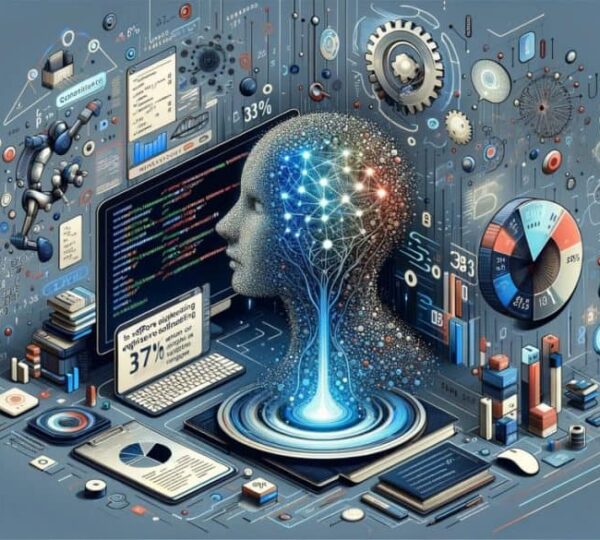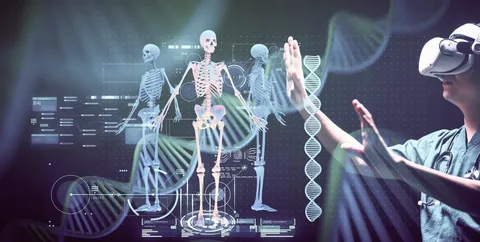Introduction
Artificial Intelligence continues to evolve at a rapid pace, reshaping industries and transforming the way we live and work. From automating routine tasks to offering insights through data analysis, AI reach is expanding, and its capabilities are continuously growing. This year promises to bring several new trends and advancements in AI that will change the landscape of technology. These trends will impact everything from healthcare and finance to retail and customer service, providing businesses and individuals with more intelligent, efficient solutions.
In this article, we will explore the top 10 emerging AI trends to watch this year, breaking down how they will impact various sectors and how you can leverage these advancements to stay ahead in a rapidly changing world.
Generative AI
Generative AI has gained significant attention in recent years, and its potential continues to grow. Unlike traditional AI that analyzes data to make predictions or decisions, generative AI creates new content by learning patterns in data. This content can be text, images, audio, or even video.
Key Applications:
- Content Creation: AI tools like Open AI GPT models are already helping content creators produce high quality articles, blog posts, and marketing materials. These systems are becoming increasingly proficient in creating human like text.
- Art and Design: Generative AI is being used in the creation of digital artwork, music, and even architecture designs, offering artists and designers a new tool to explore their creativity.
- Synthetic Media: AI generated synthetic media, such as deepfakes or virtual influencers, is an emerging field with vast potential for marketing, entertainment, and training simulations.
What to Expect This Year:
Generative AI tools are expected to become more accessible, allowing individuals and businesses of all sizes to integrate AI powered content creation into their workflows. The year will likely see advancements in text to image, text to video generation, and deeper collaboration with humans in creative processes.
AI in Healthcare
AI potential in healthcare is vast, and it continues to grow in importance. From predictive analytics to AI driven diagnostics, AI is enabling healthcare professionals to provide better care and make more informed decisions.
Key Applications:
- Predictive Healthcare: AI models are being used to predict patient health outcomes based on historical data and medical records. These tools can alert healthcare professionals about potential health risks.
- Personalized Medicine: AI is enabling a more personalized approach to medicine by analyzing a patient genetic makeup and recommending treatments tailored to their unique needs.
- Medical Imaging: AI powered systems are already being used to analyze X rays, CT scans, and MRIs to detect early signs of diseases such as cancer, often with greater accuracy than human doctors.
What to Expect This Year:
This year, AI in healthcare will continue to mature, with more widespread use in diagnostics, patient monitoring, and personalized treatment plans. Expect advancements in AI assisted surgery, remote patient care, and AI powered virtual health assistants.
AI in Autonomous Systems
Autonomous vehicles represent one of the most talked about applications of AI. Self driving cars, trucks, and drones are changing the way we think about transportation, logistics, and delivery systems.
Key Applications:
- Self Driving Cars: Companies like Tesla, Waymo, and others are at the forefront of autonomous vehicle technology. These vehicles use AI to interpret their surroundings, make decisions, and drive safely without human intervention.
- Autonomous Drones: Drones are being used for delivery services, surveying, and monitoring environments. AI helps drones navigate and perform tasks efficiently.
What to Expect This Year
This year, expect significant advancements in autonomous driving systems, including improved safety features, better navigation algorithms, and wider adoption in logistics and urban transportation. Regulatory frameworks will also evolve, potentially allowing for increased deployment of self driving vehicles on public roads.
AI Driven Cybersecurity
As AI becomes more integrated into everyday life, cybersecurity will become increasingly important. AI is being leveraged to enhance cybersecurity by detecting and preventing cyber threats faster and more accurately.
Key Applications:
- Threat Detection: AI powered systems are being used to analyze network traffic and identify potential threats in real time. These systems can learn from past attacks and predict future vulnerabilities.
- Automated Response: AI is also being used to automatically respond to cyber threats, stopping attacks before they can do significant damage.
What to Expect This Year
In 2025, AI driven cybersecurity will become even more sophisticated, with more automated threat detection systems and adaptive learning capabilities. Businesses will adopt AI to stay one step ahead of increasingly complex cyberattacks.
AI Powered Personal Assistants
AI-powered virtual assistants, like Siri, Alexa, and Google Assistant, are increasingly becoming a part of our daily lives. These assistants are evolving to become more human-like, capable of handling more complex tasks and providing personalized experiences.
Key Applications:
- Voice Assistants: AI driven voice assistants are improving at understanding context, emotions, and intent, offering more nuanced conversations.
- Task Automation: Personal assistants will handle more aspects of daily life, from managing schedules to controlling home devices and even making decisions based on user preferences.
What to Expect This Year
AI assistants will become more advanced in their natural language understanding and offer even more personalized, proactive help. Expect AI assistants to manage multiple tasks, from managing email responses to assisting with work related projects.
AI in Retail
AI is revolutionizing the retail industry by offering more personalized shopping experiences, improving inventory management, and optimizing the supply chain.
Key Applications:
- Personalized Recommendations: Retailers are using AI to offer personalized product recommendations based on a customer browsing history, preferences, and past purchases.
- Inventory Management: AI helps retailers predict demand, ensuring that popular products are always in stock while minimizing overstocking.
- Chatbots and Virtual Assistants: Retail businesses are using AI powered chatbots to assist customers, answer questions, and provide product recommendations in real time.
What to Expect This Year
In 2025, AI will take personalization to new heights. Expect hyper personalized shopping experiences, where AI not only recommends products but also offers dynamic pricing and promotions based on real time customer data.
AI Powered Robotics
AI is enabling advanced robotics to perform tasks that were once considered impossible for machines, especially in manufacturing, healthcare, and logistics.
Key Applications:
- Manufacturing: AI driven robots are improving manufacturing efficiency by performing repetitive tasks with precision and speed.
- Logistics: Robots and drones are being used in warehouses to organize inventory and fulfill orders quickly.
- Healthcare: Robotic surgery and rehabilitation systems are powered by AI, offering patients more accurate and less invasive treatment options.
What to Expect This Year
In 2025, the adoption of AI driven robotics will increase across industries, with more advanced robots capable of performing complex tasks autonomously. Expect to see robots in more public facing roles, from retail assistants to healthcare providers.
AI in Natural Language Processing
Natural Language Processing is a field of AI focused on the interaction between computers and human language. As NLP technologies evolve, AI will improve its understanding of language and be able to engage in more meaningful conversations.
Key Applications:
- Real Time Translation: AI powered translation tools will break down language barriers in real time, improving communication across the globe.
- Sentiment Analysis: AI tools will analyze customer feedback and social media to gauge sentiment, helping businesses tailor their strategies.
- Conversational AI: Chatbots and virtual assistants will use NLP to understand context and engage in more sophisticated conversations.
What to Expect This Year
Expect significant improvements in AI language capabilities, with NLP models that are better at understanding nuances, context, and emotions. This year, AI powered language tools will become more effective at handling diverse languages and dialects.
AI in Finance
AI is transforming the financial industry by automating tasks, predicting market trends, and providing better risk management solutions.
Key Applications:
- Fraud Detection: AI algorithms are increasingly being used to identify fraudulent activities in real time by analyzing transaction patterns.
- Risk Management: AI systems are helping financial institutions better understand and manage risks by analyzing vast amounts of financial data and predicting market fluctuations.
What to Expect This Year
In 2025, AI will become more integrated into financial services, improving fraud detection, automating compliance checks, and offering personalized financial advice. Expect better risk mitigation and more efficient financial systems powered by AI.
AI in Climate Change and Sustainability
AI is playing a growing role in combating climate change and promoting sustainability by improving energy efficiency and reducing environmental impacts.
Key Applications:
- Energy Management: AI systems optimize energy consumption, making homes and businesses more energy efficient.
- Climate Modeling: AI powered models predict climate patterns, helping governments and organizations prepare for extreme weather events and mitigate damage.
- Sustainable Agriculture: AI is being used to create more sustainable farming practices by optimizing water usage, predicting crop yields, and reducing waste.
What to Expect This Year
In 2025, AI role in sustainability will increase, with more AI applications focused on reducing environmental footprints, optimizing energy use, and contributing to climate change mitigation efforts.
What is Generative AI?
Generative AI creates new content, such as text, images, or audio, by learning from existing data patterns.
How will AI impact healthcare?
AI will improve diagnostics, offer personalized treatment plans, and enhance telemedicine and virtual health assistants.
What role will AI play in autonomous vehicles?
AI will power self driving cars, optimizing routes and improving safety and traffic management.
How will AI enhance cybersecurity?
AI will detect threats in real time, analyze network traffic, and provide automated responses to cyberattacks.
How is AI transforming customer service?
AI powered chatbots and virtual assistants will provide more efficient, personalized, and real time customer interactions.
What is the impact of AI in retail?
AI will offer personalized shopping experiences, optimize inventory management, and improve customer support with AI chatbots.
How does AI improve productivity in the workplace?
AI automates repetitive tasks, allowing employees to focus on more strategic activities, boosting efficiency.
What advancements can we expect in AI-powered personal assistants?
AI assistants will become more proactive, anticipating user needs and offering personalized recommendations.
How will AI assist in addressing climate change?
AI will optimize energy consumption, improve climate modeling, and support sustainable agriculture practices.
What is AI role in finance?
AI will enhance fraud detection, improve risk management, and provide personalized financial advice.
Conclusion
The top AI trends of 2025 showcase the vast potential of this technology to reshape industries and improve daily life. From generative AI that enhances creativity to autonomous vehicles that transform transportation, the future of AI promises to be an exciting journey. Businesses and individuals must stay informed and adapt to these advancements to leverage AI full potential responsibly and effectively.


